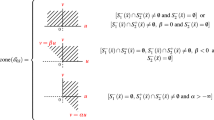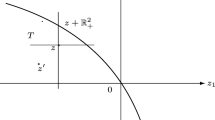Abstract
Some production models in finance require infinite-dimensional commodity spaces, where efficiency is defined in terms of an ordering cone having possibly empty interior. Since weak efficiency is more tractable than efficiency from a mathematical point of view, this paper characterizes the equality between efficiency and weak efficiency in infinite-dimensional spaces without further assumptions, like closedness or free disposability. This is obtained as an application of our main result that characterizes the solutions to a unified vector optimization problem in terms of its scalarization. Standard models as efficiency, weak efficiency (defined in terms of quasi-relative interior), weak strict efficiency, strict efficiency, or strong solutions are carefully described. In addition, we exhibit two particular instances and compute the efficient and weak efficient solution set in Lebesgue spaces.
Similar content being viewed by others
References
Zame, William R.: Competitive equilibria in production economies with an infinite-dimensional commodity space. Econometrica 55, 1075–1108 (1987)
Bonnisseau, J.-M., Crettez, B.: On the characterization of efficient production vectors. Econ. Theor. 31, 213–223 (2007)
Bonnisseau, J.-M., Cornet, B.: Existence of equilibria when firms follows bounded losses pricing rules. J. Math. Econ. 17, 119–147 (1988)
Luc, D.T.: Theory of Vector Optimization. Lecture Notes in Economics and Mathematical Systems, vol. 2. Springer, Berlin (1989)
Jahn, J.: Vector optimization. Theory, Applications and Extensions. Springer, Berlin (2004)
Flores-Bazán, F., Hernández, E., Novo, V.: Characterizing efficiency without linear structure: a unified approach. J. Global Optim. 41(1), 43–60 (2008)
Flores-Bazán, F., Hernández, E.: A unified vector optimization problem: complete scalarizations and applications. Optimization 60, 1399–1419 (2011)
Gerth, C., Weidner, P.: Nonconvex separation theorems and some applications in vector optimization. J. Optim. Theory Appl. 67, 297–320 (1990)
Eichfelder, G.: Adaptive Scalarization Methods in Multiobjective Optimization. Springer, Berlin (2008)
Bot, R.I., Grad, S.M.: Duality for vector optimization via a general scalarization. Optimization 60, 1269–1290 (2011)
Hiriart-Urruty, J.-B.: Tangent cones, generalized gradients and mathematical programming in Banach spaces. Math. Oper. Res. 4, 79–97 (1979)
Zaffaroni, A.: Degrees of efficiency and degrees of minimality. SIAM J. Control Optim. 42, 1071–1086 (2003)
Durea, M., Dutta, J., Tammer, C.: Lagrange multipliers for \(\varepsilon \)-Pareto solutions in vector optimization with nonsolid cones in Banach spaces. J. Optim. Theory Appl. 145, 196–211 (2010)
Luenberger, D.G.: New optimality principles for economics efficiency and equilibrium. J. Optim. Theory Appl. 75, 221–264 (1992)
Pascoletti, A., Serafini, P.: Scalarizing vector optimization problems. J. Optim. Theory Appl. 42, 499–524 (1984)
Gerstewitz, C.H., Iwanow, E.: Dualit\(\ddot{\text{ a }}\)t f\(\ddot{\text{ u }}\)r nichtkonvexe Vektoroptimierungsprobleme. Wiss. Z. Tech. Hochsch. Ilmenau 31, 61–81 (1985)
Rubinov, A.M.: Sublinear operator and theirs applications. Rus. Math. Surveys 32, 113–175 (1977)
Rubinov, A.M., Gasimov, R.N.: Scalarization and nonlinear scalar duality for vector optimization with preferences that are not necessarily a preorder relation. J. Global Optim. 29, 455–477 (2004)
Hernández, E., Rodríguez-Marín, L.: Nonconvex scalarization in set optimization with set-valued maps. J. Math. Anal. Appl. 325, 1–18 (2007)
Tammer, C., Zalinescu, C.: Lipschitz properties of the scalarization function and applications. Optimization 59, 305–319 (2010)
Göpfert, A., Riahi, H., Tammer, Ch., Zalinescu, C.: Variational Methods in Partially Ordered Spaces. CMS Books in Mathematics. Springer, New york (2003)
Chen, G-Y.; Huang, X.; Yang, X., “Vector optimization. Set-valued and variational analysis”. Lecture Notes in Economics and Mathematical Systems, 541. Springer-Verlag, Berlin, 2005.
Gutiérrez, C., Jiménez, B., Novo, V.: A unified approach and optimality conditions for approximate solutions of vector optimization problems. SIAM J. Optim. 17, 688–710 (2006)
Gutiérrez, C., Jiménez, B., Novo, V.: Optimality conditions via scalarization for a new \(\varepsilon \)-efficiency concept in vector optimization problems. Eur. J. Oper. Res. 201, 11–22 (2010)
Gutiérrez, C., Jiménez, B., Novo, V.: Improvements sets and vector optimization. Eur. J. Oper. Res. 223, 304–311 (2012)
Weidner, P.: On the characterization of efficient points by means of monotone functionals. Optimization 19, 53–69 (1988)
Borwein, J.M., Lewis, A.S.: Partially finite convex programming, Part I: quasi relative interiors and duality theory. Math. Program. A 57, 15–48 (1992)
Limber, M.A., Goodrich, R.K.: Quasi interiors, Lagrange multipliers, and \(L^p\) spectral estimation with lattice bounds. J. Optim. Theory Appl. 78, 143–161 (1993)
Grad, A.: Quasi-relative interior-type constraint qualifications ensuring strong Lagrange duality for optimization problems with cone and affine constraints. J. Math. Anal. Appl. 361, 86–95 (2010)
Li, S.J., Yang, X.Q., Chen, G.Y.: Nonconvex vector optimization of set-valued mappings. J. Math. Anal. Appl. 283, 337–350 (2003)
Follmer, H., Schied, A.: Convex measures of risk and trading constraints. Financ. Stoch. 6, 429–447 (2002)
Jeyakumar, V., Oettli, W., Natividad, M.: A solvability theorem for a class of quasiconvex mappings with applications to optimization. J. Math. Anal. Appl. 179, 537–546 (1993)
Drummond, L.D.G., Maculan, N., Svaiter, B.F.: On the choice of parameter for the weighting method in vector optimization. Math. Program. Ser. B 111, 201–216 (2008)
Chicco, M., Mignanego, F., Pusillo, L., Tijs, S.: Vector optimization problems via improvements sets. J. Optim. Theory Appl. 150, 516–529 (2011)
Flores-Bazán, F., Hernández, E.: Optimality conditions for a unified vector optimization problem with not necessarily preordering relations. J. Global Optim. 56, 299–325 (2013)
Breckner, W.W., Kassay, G.: A systematization of convexity concepts for sets and functions. J. Convex Anal. 4, 109–127 (1997)
Bao, T.Q., Mordukhovich, B.S.: Relative Pareto minimizers for multiobjective problems: existence and optimality conditions. Math. Program. A 122, 301–347 (2010)
Aliprantis, C.D., Brown, D.J., Burkinshaw, O.: Existence and optimality of competitive equilibria. Springer, Berlin (1989)
Flores-Bazán, F., Laengle, S., Loyola, G.: Characterizing the efficient points without closedness or free-disposability. Cent. Eur. J. Oper. Res. 21, 401–410 (2013)
Debreu, G.: Theory of Value. Wiley, New York (1959)
Magill, M., Quinzii, M.: Theory of incomplete markets, vol. 1. MIT Press, Cambridge (1996)
Acknowledgments
This research, for the first author, was supported in part by CONICYT-Chile through FONDECYT 112-0980 and BASAL projects, CMM, Universidad de Chile. Support by Ecos-Conicyt CE08-2010 and MATH-AmSud 13math-01 are also greatly acknowledged. The authors also wants to express their great gratitude to Nicolas Hadjisavvas for very stimulating discussions during the last stage of this final version.
Author information
Authors and Affiliations
Corresponding author
Additional information
Communicated by Johannes Jahn.
Rights and permissions
About this article
Cite this article
Flores-Bazán, F., Flores-Bazán, F. & Laengle, S. Characterizing Efficiency on Infinite-dimensional Commodity Spaces with Ordering Cones Having Possibly Empty Interior. J Optim Theory Appl 164, 455–478 (2015). https://doi.org/10.1007/s10957-014-0558-y
Received:
Accepted:
Published:
Issue Date:
DOI: https://doi.org/10.1007/s10957-014-0558-y
Keywords
- Vector optimization
- Scalarization
- Efficiency
- Infinite-dimensional commodity space
- Quasi-relative interior




